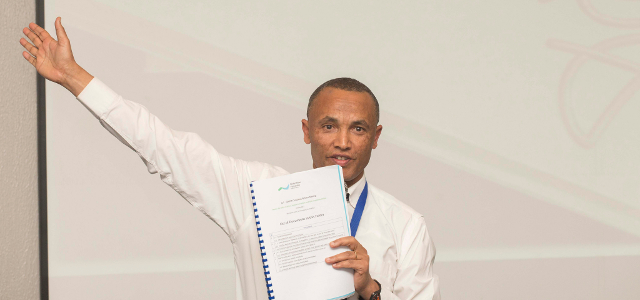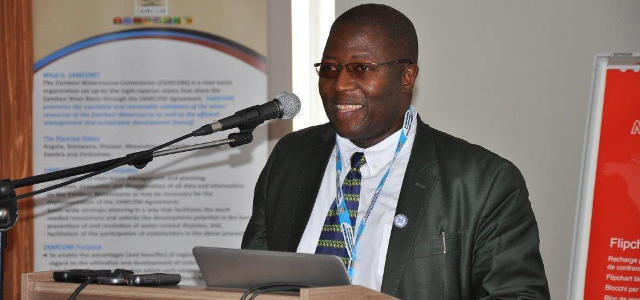Speaking on the upcoming 8th SADC Multi-Stakeholder Water Dialogue, Dr. Kenneth Msibi, Policy and Strategy Expert in the SADC Secretariat Water Division, reiterated the need for water, energy and food sectors to work together to ensure minimum resource losses and inefficiencies whilst at the same time creating jobs. He added that in line with alleviating unemployment this coming Dialogue looks at exploring how the Nexus approach can be implemented in the SADC region to foster regional value chains and support in creating and sustaining jobs – through building synergies and integrated planning.
“The objective of this year’s Dialogue is to provide a platform for water, energy, food, economic planning and gender policymakers and practitioners to develop strategies that will ensure that Nexus approaches contribute to fostering regional value chains and job creation. Job creation and wealth creation can never be detached, as it is through wealth creation that we create jobs,” said Dr. Msibi.
He indicated that this year’s Dialogue is the second one which focuses on the EU Water-Energy-Food (WEF) Nexus Dialogue Program, following the 2013 Dialogue, which was themed, “Watering development in SADC: Exploring the water, energy and food Nexus for regional development”. Dr. Msibi also commended the Dialogue for its contribution in raising awareness on the Nexus approach and its potential contribution to the region's development agenda.
The EU Water-Energy-Food Nexus Dialogue Program is a European Union initiative earmarked for five regions in the world which are; Latin America (Andean region), Asia (Mekong Area), Central Asia (Aral Sea region), Neighbourhood (with particular focus on the Middle East and North Africa (MENA) region) and Africa (Niger and SADC).
Global Water Partnership Southern Africa (GWPSA) has been mandated to implement the Nexus programme in the Southern Africa region on behalf of the SADC Secretariat. During the first phase, running from 2017 to 2019, GWPSA is preparing a framework which will help SADC create an enabling environment to promote Nexus investments in the region.
Speaking on the WEF Nexus, GWPSA's Technical Advisor and Project Manager for SADC-EU Water-Energy-Food Nexus, Mr. Kidanemariam Jembere, indicated that the region still has challenges in ensuring water and food security as well as energy supply, despite the huge potential the region has in terms of the three resources.
“The Nexus approach, we are expecting, will help us meet water, energy and food security simultaneously so that we reduce investment costs and maximise resource utilisation. The approach will give us an opportunity to see how to bring resource (water, land and energy) use efficiency without harming the natural environment as well as minimizing trade-offs and increasing synergies between the three sectors and their resource uses. The process is also supposed to facilitate a balanced decision-making process between the three sectors, pointed out Mr. Jembere.

He emphasized that the Nexus approach moves away from a sectorial approach to a cross-sectorial integrated approach which entails institutions of agriculture, energy and water working together towards the attainment of Nexus objectives, without any sector negatively affecting the others. He added that as the implementing partner, GWPSA works on bringing various stakeholders at all levels within the countries and the region as a whole, which is key to the success of the Nexus approach.
Convened by Global Water Partnership Southern Africa behalf of SADC Secretariat's Water Division since 2007, under the broad theme “Watering Development in SADC”, the Dialogue has been premised on raising the awareness and understanding of how Integrated Water Resources Management (IWRM) approaches can contribute to socio-economic development and poverty eradication by ensuring a water secure region. The underlying objective of the Dialogue over the past decade has been to ensure that the interventions in the water sector are well communicated to the non-water sector actors and also create an environment to receive inputs from them.
Further to providing a forum for practitioners in the region to have a discourse with water using and water influencing sectors, SADC uses the Dialogue as an opportunity to draw various stakeholders to provide solutions and recommendations aimed at ensuring that water continues to enable socio-economic development in the region. Moreover, SADC integrates the outcomes from the Dialogue into the secretariat’s programmes and responses at different levels.
Funded by the European Commission (EC), DANIDA, UKAid and implemented by GIZ, this year’s Dialogue will be hosted by the South African Government through the Department of Water and Sanitation (DWS) under the theme “Fostering Regional Value Chains and Job Creation through the Water-Energy-Food (WEF) Nexus Approaches”.
The dialogue will be held at Birchwood Hotel and OR Tambo Conference Centre on 21 and 22 November 2017.
For information and pictures on this event, please follow this Spark link
